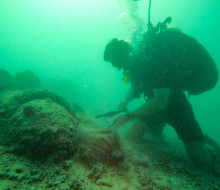
Second World War-era bombs in Vanuatu made safe by Navy divers
26 June 2024
Unfortunately you are viewing this website on an outdated browser which does not support the necessary features for us to provide an adequate experience. Please switch to a modern browser such as latest version of Google Chrome, Mozilla Firefox, Apple Safari or Microsoft Edge.
Ngā mihi nui
Second Lieutenant Natasha Whyte says seeing other women setting excellent examples in the New Zealand Defence Force gives her confidence in her own journey as an engineer.
Originally from Dunedin, Second Lieutenant Whyte joined the Army Reserve Force in 2018 while studying Communication Design and Teaching at Otago University.
“I come from a very outdoorsy, active family. I grew up in Central Otago hunting, fishing, tramping and doing plenty of sports.
“My grandad was an Assault Pioneer as a young man, and my father was a Territorial Forces infantry soldier in the 1980s. My grandfather on my father’s side also served in World War II in the Infantry.”
She said the military appealed to her for the challenge, greater sense of purpose and ability to make a difference.
“A background in community service through Surf Life Saving enabled me to be involved in something larger than myself from a young age - instilling the sense of duty to my country which has influenced my path to the military.
“Engineering particularly stood out as an opportunity to give back to New Zealand, and as a job where I would learn and be challenged every day.”
After graduating into the Royal New Zealand Engineers in 2022, Second Lieutenant Whyte is now the Apprentice Troop Commander at the School of Military Engineering at Manawatū’s Linton Military Camp, where she looks after almost 80 carpenters, plumbers and electrical apprentices, working with a large body of senior non-commissioned officers.
“Most of my days are filled with administration and planning to ensure our sappers’ welfare is looked after. Some days, I’ll get to be on a bridging site, conducting exercises or on demolition tasks - it all depends on the time of year and training outputs.”
Triathlon is her main passion outside of her day job.
“Spending hours and hours of hard work to achieve a goal in the sporting world has shown me I can do the same within the military, and as a result I can continue to set a good example for my subordinates and perform well under physical and mental stressors.”
Having mentors and people to look up to in the Defence Force has helped Second Lieutenant Whyte’s progress and effectiveness in her team and unit.
“I have noticed that my own leadership style - and that of women above me - can often be unique or different to our male counterparts in the same space.
“I believe we can bring elements to our immediate circles and broader Defence which are invaluable. Emotional intelligence, altruistic tendencies, passion and drive of many females in Defence - to meet and often exceed the standards set by male counterparts - is incredibly inspiring.”
She has recently attended a workshop for wāhine in the New Zealand Defence Force.
“It’s another encouraging step to better understanding women’s roles in Defence and how we can be better supported in this unique working environment.”
What Second Lieutenant Whyte has learned from senior female role models is that despite being a smaller portion of those holding Defence leadership positions, their contribution and leadership is important, valued and positively affects those they work with.
“Female leaders can ‘flick a switch’, particularly in the field, to command in a more dominant manner, but I have learnt there are alternative and effective ways to lead and care for our soldiers that come more naturally for me.”
She said being honest, open, professional and competent, while caring for her subordinates, works well.
“Setting standards like this, and encouraging others to do the same, creates safe working environments where team cohesion and individual empowerment is high.
“Defence has come a long way for not only women, but other minority groups within Defence. I do believe there is still room for development through research, engagement with serving/ex-serving personnel, and education to continue to reap the benefits of having a diverse Defence Force.”